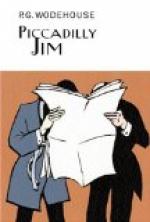It was Mrs. Crocker’s habit, acquired after years of practice and a sedulous study of the best models, to conceal beneath a mask of well-bred indifference any emotion which she might chance to feel. Her dealings with the aristocracy of England had shown her that, while the men occasionally permitted themselves an outburst, the women never did, and she had schooled herself so rigorously that nowadays she seldom even raised her voice. Her bearing, as she approached the morning-room was calm and serene, but inwardly curiosity consumed her. It was unbelievable that Nesta could have come to try to effect a reconciliation, yet she could think of no other reason for her visit.
She was surprised to find three persons in the morning-room. Bayliss, delivering his message, had mentioned only Mrs. Pett. To Mrs. Crocker the assemblage had the appearance of being a sort of Old Home Week of Petts, a kind of Pett family mob-scene. Her sister’s second marriage having taken place after their quarrel, she had never seen her new brother-in-law, but she assumed that the little man lurking in the background was Mr. Pett. The guess was confirmed.
“Good morning, Eugenia,” said Mrs. Pett.
“Peter, this is my sister, Eugenia. My husband.”
Mrs. Crocker bowed stiffly. She was thinking how hopelessly American Mr. Pett was, how baggy his clothes looked, what absurdly shaped shoes he wore, how appalling his hat was, how little hair he had and how deplorably he lacked all those graces of repose, culture, physical beauty, refinement, dignity, and mental alertness which raise men above the level of the common cock-roach.
Mr. Pett, on his side, receiving her cold glance squarely between the eyes, felt as if he were being disembowelled by a clumsy amateur. He could not help wondering what sort of a man this fellow Crocker was whom this sister-in-law of his had married. He pictured him as a handsome, powerful, robust individual with a strong jaw and a loud voice, for he could imagine no lesser type of man consenting to link his lot with such a woman. He sidled in a circuitous manner towards a distant chair, and, having lowered himself into it, kept perfectly still, pretending to be dead, like an opossum. He wished to take no part whatever in the coming interview.
“Ogden, of course, you know,” said Mrs. Pett.
She was sitting so stiffly upright on a hard chair and had so much the appearance of having been hewn from the living rock that every time she opened her mouth it was as if a statue had spoken.
“I know Ogden,” said Mrs. Crocker shortly. “Will you please stop him fidgeting with that vase? It is valuable.”
She directed at little Ogden, who was juggling aimlessly with a handsome objet d’art of the early Chinese school, a glance similar to that which had just disposed of his step-father. But Ogden required more than a glance to divert him from any pursuit in which he was interested. He shifted a deposit of candy from his right cheek to his left cheek, inspected Mrs. Crocker for a moment with a pale eye, and resumed his juggling. Mrs. Crocker meant nothing in his young life.




